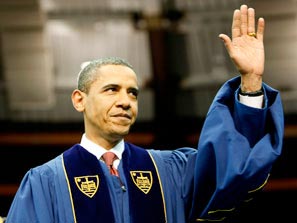Atheists Keep Faith with Barack Obama
By Daniel Libit | Jun 20, 2009

How much faith should the faithless put in Barack Obama?
The president said in his inaugural address that the United States is “a nation of Christians and Muslims, Jews and Hindus and nonbelievers.” And in his commencement speech at the University of Notre Dame, he said that the Golden Rule binds “people of all faiths and no faith together.”
While the atheist community appreciates the shout-outs, George W. Bush offered similar acknowledgements of nonbelievers during his presidency. And like Bush, Obama has repeatedly invoked religion in his speeches. The latest dose came Thursday in Cairo, in his speech to the Muslim world, during which Obama talked of the “Holy Quran” and invoked this Quranic supplication: “Be conscious of God, and speak always the truth.”
But while atheist advocates railed against Bush, they seem willing to give Obama a pass on his God talk — at least for now.
Nathan Bupp, director of communications for the Center for Inquiry, says that many nonbelievers view Obama’s invocations of faith as nothing more than a “symbolic gesture” used to aid his quest for social justice.
“There is a sense where secularists are politically savvy enough to do this,” says Bupp. “They realize [Obama] is not doing what he’s doing for Pat Robertson-type reasons.”
Over the past several years, in large part in response to the Sept. 11 attacks and the Bush presidency, the American atheist movement reached its rabble-rousing zenith, underscored by the publishing success of anti-God manifestos like Sam Harris’ “End of Faith,” Christopher Hitchens’ “God Is Not Great” and Richard Dawkins’ “The God Delusion.”
In Obama, the community saw a prospect for change.
But now, Ed Buckner, president of the American Atheists, wonders whether advocates and activists may witness a one-step-forward, two-steps-backward phenomenon with Obama.
While grateful for the new president’s cap-tipping, Buckner says, “The fact that our best shot of making things better still goes around saying God stuff all the time in some ways maybe makes it worse.”
Rep. Pete Stark (D-Calif.), the highest-ranking U.S. politician to claim unbelief in a higher power, cautions atheists not to put too much faith in a religious politician — even one raised by a secular humanist mother.
“Underneath it all, he is a pretty standard Christian, go-by-the-book kind of person,” Stark says of the president. “Look at all the stuff he is trying to do in the White House. I mean, come on. I think that is probably not constitutional.”
Stark is referring to Obama’s White House Office of Faith-Based and Neighborhood Partnerships, a continuation of a Bush initiative that troubled a number of freedom-from-religion types. Like Bush’s, Obama’s faith-based office has yet to make a practice of disallowing organizations that engage in religious hiring discrimination from being eligible for funds. The administration has simply said it will evaluate each organization on a case-by-case basis.
Though disappointed by this, Toni Van Pelt, director and chief lobbyist for the Center for Inquiry, thinks that now is the time for nonbelievers to tread lightly, “in a thoughtful way, to be successful and not suffer a severe backlash.”
As part of this, Van Pelt says nonbelievers are wise to keep their consternation in check, particularly over such things as rhetorical matters.
“I don’t want you to think that I am undercutting the importance of cultural messages,” she says, “but pragmatically, there are some really serious things that we need to focus our work on.”
And, to be sure, Obama has pleased many secular humanists with specific actions he’s already undertaken, such as overturning a last-minute Bush order that gave protection to health care providers who refuse to attend to medical requests on account of their personal beliefs. In addition, advocates say they have been heartened by Obama’s push for “evidence-based” science policy, as well as his individual selections for administration science posts.
Last week, the Secular Coalition for America, an atheist advocacy group, held its first-ever individual face-to-face with the White House. Ron Millar, the coalition’s acting director, told POLITICO that he met with Paul Montero, Obama’s religious liaison in the White House Office of Public Engagement.
Obama “is opening a little door to include us in, which we are very appreciative of,” says Millar, who says he anticipates a number of additional such meetings with the administration.
Among the concerns Millar says he touched on was proselytizing in the U.S. military: “That is something we really want to follow up with this administration, because we have not seen much there.”
In April, Joshua DuBois, the Pentecostal minister who now heads Obama’s faith-based office, met with representatives from the Coalition Against Religious Discrimination. Van Pelt, who was among the participants, says that she and others relayed their concerns over the discriminatory hiring practices of faith-based institutions receiving federal funds.
“We have stated what our position is,” Van Pelt says. “But, frankly, we’ve been told that they are listening. They have not been imparting much information to us. So it is kind of a wait-and-see attitude [on our part].”
Meanwhile, some nonbelievers are also nervously waiting to see whether Obama will appoint former Human Genome Project Director Frances Collins, a born-again Christian, to run the National Institutes of Health. Bloomberg News recently reported that Collins was the front-runner for the position, a prospect that troubles folks such as Harris.
But for the most part, atheist groups are keeping quiet on this, deciding that their best bet is to give Obama the benefit of the doubt.
“The one important thing to recognize,” says Harris, “is [Obama] is so much better than the last guy in the Oval Office, and everyone is feeling so much relief for the change he has brought, that they are inclined not to gripe too much about all the delusional stuff he may be paying lip service to or holding over from the previous administration.”















